
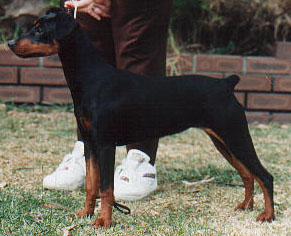
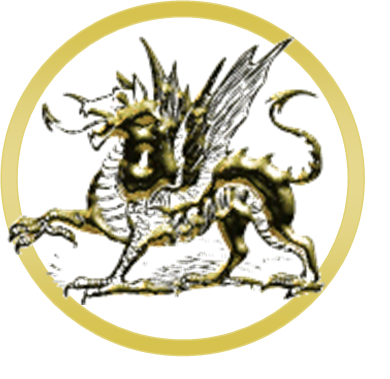
"The Pinscher is extremely intelligent, always perky, quick-witted and attentive. He requires understanding and discipline and if given sufficient loving blends into his family and is an ideal, delightful house dog and companion." ...........Werner Jung
German Pinschers in a nutshell are curious, attentive dogs who are highly intelligent, loyal and affectionate hunting and guarding dogs. The other side of the coin is its personality as they are also tenacious, fearless, serious hunters and protective. Then they have its fun loving, clown of the dog world side to his personality. Therefore they can be quite a challenge and need very good socialising and training from a young ages. Thinking outside the box on the owner's part to guide all these characteristics in the right direction and develop a happy successful member of the family is necessary to have a happy dog and household. A combination of positive, treat and force training is usually the ideal for this breed, being able to outsmart them is the key.
***

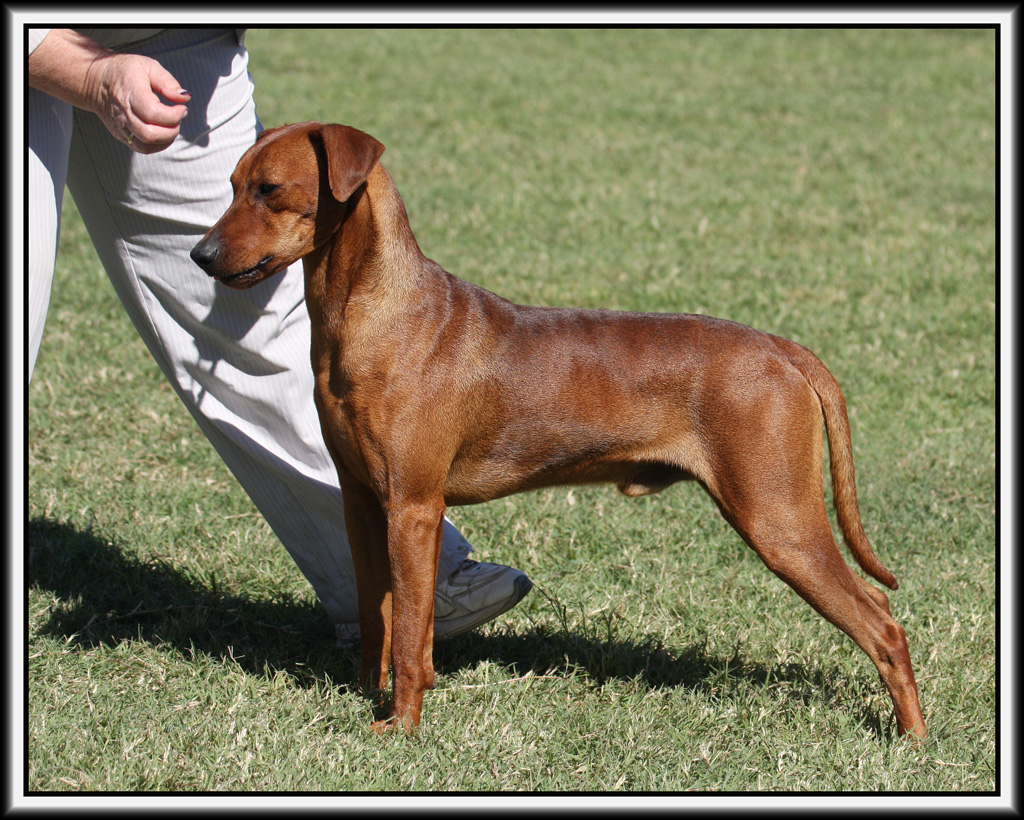


















Origin
The German Pinscher was officially recognized in Germany in 1879 and has been protected and promoted since 1894 by the German Pinscher Schnauzer Club. During the years around the turn of the century, both smooth pinscher and coarse-haired schnauzer pups appeared in the same litters. The club initiated a policy requiring proof of three generations of pure smooth coats for registration. This quickly helped set type and made them a distinct breed from the Schnauzer. The German Pinscher played a role in the development of the Doberman and the Miniature Pinscher. The German Pinscher was recognized by the AKC in 2003. It has been used on farms as a vermin destroyer, herding livestock, watchdog, guard dog and family pet.
About the German Pinscher...
The GP can be an ideal companion dog. This rare breed is brave, not squeamish, sober, and has considerable stamina. It is lively but docile, quite versatile, and a vocal guard dog. It responds to obedience training. If it senses the humans around it are meek or passive it will become bull-headed and stubborn. This breed needs to clearly know who is boss. Proper human to canine communication is essential. This breed only barks when it feels it is necessary, which may be often. Visitors will be announced with loud barking but then things usually calm down quickly. If the dog does not stop barking owners need to tell the dog enough is enough and to quiet down. The German Pinscher needs to know it owns nothing and is clearly a subordinate of humans or owners will have a very hard time with it. Children need to know how to display proper pack leader skills. If the dog thinks its humans are in trouble it will instinctively protect and will bite first without thinking about it. Like other pincers and terriers, this breed does not back away from dominance challenges with other dogs, and needs firm handling to control its fighting tendencies through proper communication. German Pinchers are very loyal and protective. They will defend their territory, handler, and the family to the end against those intent upon harm. Without proper leadership they can also get protective of their own things like their bones, a chair or their food. The owner needs to set the guidelines and let the dog know it cannot growl at them or other humans. The dog must be taught that it is not "Top Dog". It needs to know its place in the house. Normally they get along well with other household pets. However, they are ratters and when outdoors they will chase a cat, possibly hurting it. This breed requires a firm hand from an experienced dog owner so it doesn't grow up to take over the whole house.
Highly recommended further reading. http://www.german-pinschers.net/news/news.htm
The German Pinscher was officially recognized in Germany in 1879 and has been protected and promoted since 1894 by the German Pinscher Schnauzer Club. During the years around the turn of the century, both smooth pinscher and coarse-haired schnauzer pups appeared in the same litters. The club initiated a policy requiring proof of three generations of pure smooth coats for registration. This quickly helped set type and made them a distinct breed from the Schnauzer. The German Pinscher played a role in the development of the Doberman and the Miniature Pinscher. The German Pinscher was recognized by the AKC in 2003. It has been used on farms as a vermin destroyer, herding livestock, watchdog, guard dog and family pet.
About the German Pinscher...
The GP can be an ideal companion dog. This rare breed is brave, not squeamish, sober, and has considerable stamina. It is lively but docile, quite versatile, and a vocal guard dog. It responds to obedience training. If it senses the humans around it are meek or passive it will become bull-headed and stubborn. This breed needs to clearly know who is boss. Proper human to canine communication is essential. This breed only barks when it feels it is necessary, which may be often. Visitors will be announced with loud barking but then things usually calm down quickly. If the dog does not stop barking owners need to tell the dog enough is enough and to quiet down. The German Pinscher needs to know it owns nothing and is clearly a subordinate of humans or owners will have a very hard time with it. Children need to know how to display proper pack leader skills. If the dog thinks its humans are in trouble it will instinctively protect and will bite first without thinking about it. Like other pincers and terriers, this breed does not back away from dominance challenges with other dogs, and needs firm handling to control its fighting tendencies through proper communication. German Pinchers are very loyal and protective. They will defend their territory, handler, and the family to the end against those intent upon harm. Without proper leadership they can also get protective of their own things like their bones, a chair or their food. The owner needs to set the guidelines and let the dog know it cannot growl at them or other humans. The dog must be taught that it is not "Top Dog". It needs to know its place in the house. Normally they get along well with other household pets. However, they are ratters and when outdoors they will chase a cat, possibly hurting it. This breed requires a firm hand from an experienced dog owner so it doesn't grow up to take over the whole house.
Highly recommended further reading. http://www.german-pinschers.net/news/news.htm




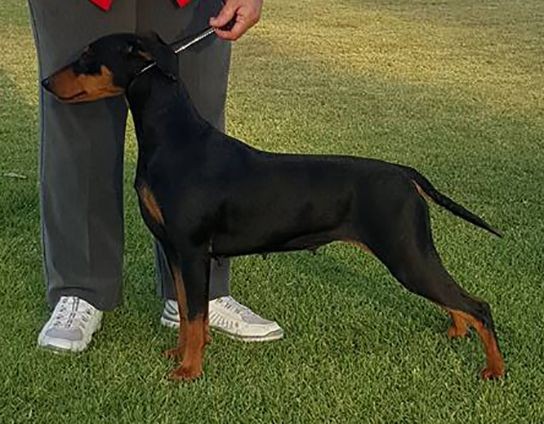

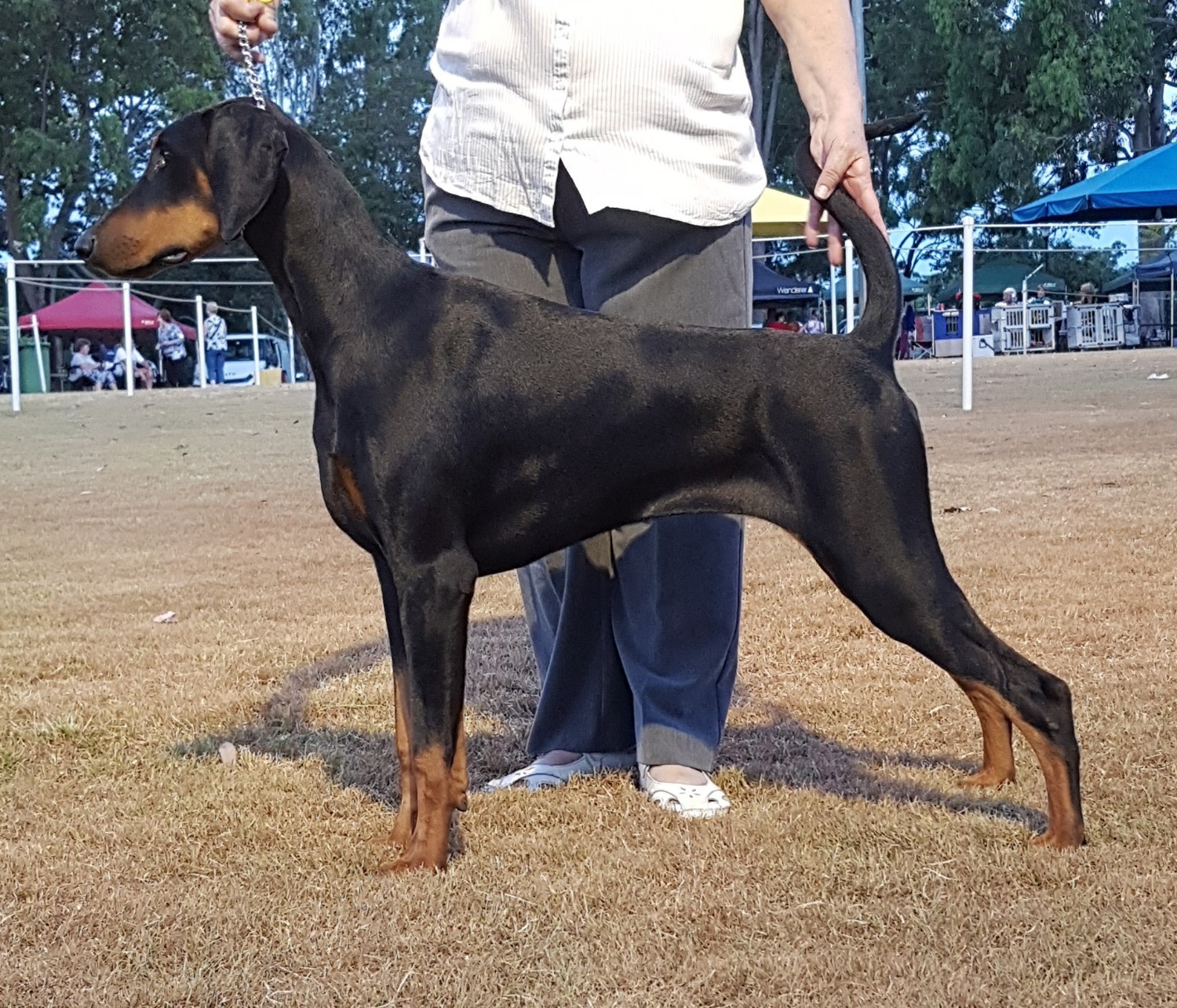 Please redirect to our new improved website.
Please redirect to our new improved website.https://www.masterkarn.net/
 Please redirect to our new improved website.
Please redirect to our new improved website.https://www.masterkarn.net/